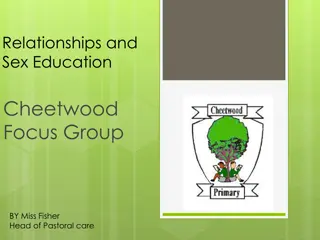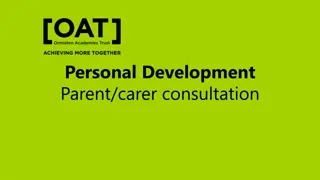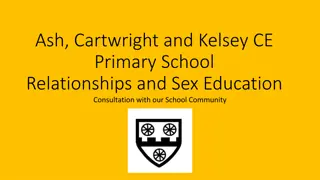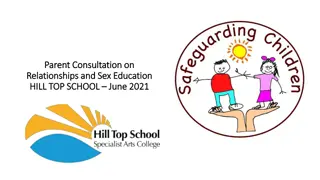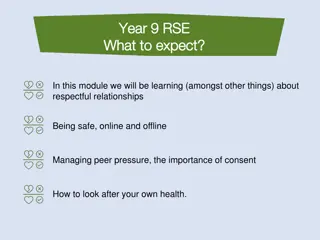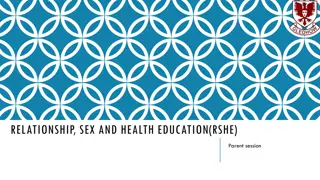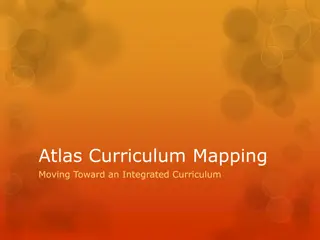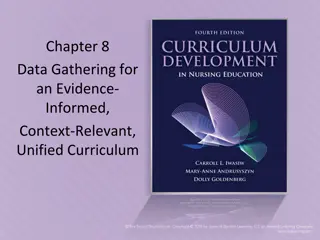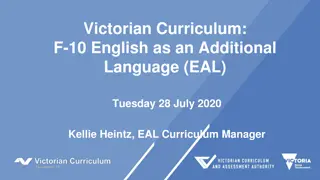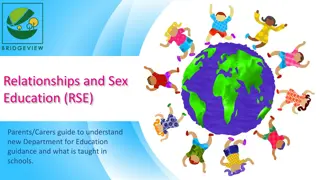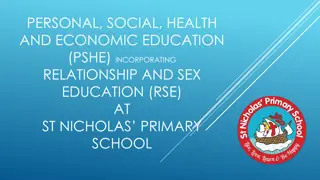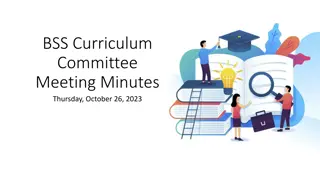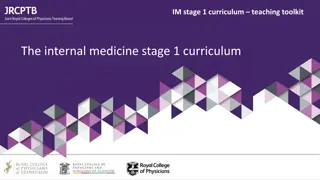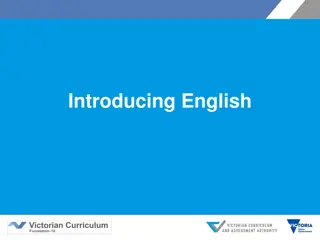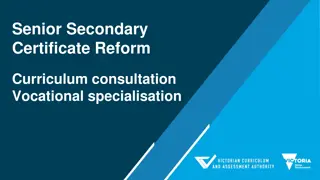RSE Curriculum Overview at All Hallows
During the Summer term, All Hallows students participate in the Ten:Ten RSE programme, aligning the content with Catholic beliefs. The curriculum covers themes such as Families, Respectful Relationships, Online Safety, Intimate and Sexual Relationships, delivered through various subjects and over the 5-year period to ensure age-appropriate understanding and continuous learning.
Download Presentation

Please find below an Image/Link to download the presentation.
The content on the website is provided AS IS for your information and personal use only. It may not be sold, licensed, or shared on other websites without obtaining consent from the author. Download presentation by click this link. If you encounter any issues during the download, it is possible that the publisher has removed the file from their server.
E N D
Presentation Transcript
RSE at All Hallows Where does RSE sit in our Curriculum?
During the Summer term ALL students at All Hallows will undertake the Ten:Ten RSE programme, delivering the RSE content from the point of view of the Catholic Church. All themes are discussed and related back to Catholic beliefs. There are additional lessons within the PD curriculum that also address the statutory RSE themes of; Families, Respectful Relationships, Online and Media, Being Safe and Intimate and Sexual Relationships. These are in addition to the delivery of the RSE themes through the RE lessons and parts of the Science curriculum. This powerpoint will outline where lessons with an RSE theme will be delivered over the 5 years at All Hallows. These key themes are revisited at various times during the 5 years in order to build on pupils understanding at an age appropriate level.
Year 7 Families: During year 7 pupils will learn that there are different types of committed and stable relationships and how these relationships might contribute to happiness and the raising of children. They will learn to understand that not all adults and information is trustworthy and where to go for help and advice or to report their concerns. They will be able to judge when a relationship is unsafe and where to get help in this situation. Respectful relationships, including friendships: Pupils will learn the characteristics of positive and healthy relationships, including friendships and other (non-sexual) relationships. They will develop steps they can take to improve and support respectful relationships and understand the importance of respect for and tolerance of others beliefs and the legal rights and responsibilities as defined in the Equality Act 2010, accepting that everyone is unique and equal in their own rights. They will understand the impact of different types of bullying and the responsibility we have for reporting and preventing bullying. Online and the media: Pupils will learn their rights, responsibilities and opportunities online as well as the expectations of their behaviour. They will learn the dangers of sharing personal information, including images, with others and online and how difficult it is to remove them from public access. They will understand that sharing personal or private information about other people is wrong and can have legal consequences. They will also learn how information and data is generated and collected before being used online and where to get support to report material online that makes them uncomfortable. They will learn that sharing indecent images of children is a criminal offence and that there are severe penalties for doing so. Intimate and sexual relationships, including sexual health: Year 7 pupils will learn how to recognise the characteristics and positive aspects of healthy one-to-one and intimate relationships, the facts about reproductive health and the factors that can affect fertility in both men and women. Pupils will also learn the facts surrounding pregnancy, including miscarriage.
Year 8 Families: Pupils will build on their learning from year 7 to discuss how different types of committed, stable relationships can contribute to human happiness and the raising of children and the roles, responsibilities and characteristics of successful parenting. They will further discuss that not all adults and information is trustworthy and where to go for help and advice or to report their concerns. They will be able to judge when a relationship is unsafe and where to get help in this situation. Respectful relationships, including friendships: Pupils will further discuss characteristics of positive and healthy relationships, including friendships and other (non-sexual) relationships. They will develop further steps they can take to improve and support respectful relationships and understand the importance of respect for and tolerance of others beliefs and the legal rights and responsibilities as defined in the Equality Act 2010, accepting that everyone is unique and equal in their own rights. They will understand the impact of different types of bullying and the responsibility we have for reporting and preventing bullying. Pupils will also begin to understand that some types of behaviours within relationships are criminal, including violent and coercive control as well as what constitutes sexual harassment and sexual violance and why these bahaviours are always unacceptable. Online and the media: Pupils will further discuss their rights, responsibilities and opportunities online as well as the expectations of their behaviour. They will develop a deeper understanding of the dangers of sharing personal information, including images, with others and online and how difficult it is to remove them from public access. They will understand that sharing personal or private information about other people is wrong and can have legal consequences. They will learn that specifically sexually explicit material e.g pornography, can damage their views on relationships as well as themselves and that sharing indecent images of children is a criminal offence and that there are severe penalties for doing so. Being Safe: They will begin to understand the concept of, and laws relating to unacceptable sexual behaviours and how they can affect current and future relationships. Intimate and sexual relationships, including sexual health: Pupils will continue to discuss how to recognise the characteristics and positive aspects of healthy one-to-one and intimate relationships. They will begin to discuss how all aspects of health can be affected by the choices they make in sex and relationships and begin to understand a range of strategies for identifying and managing sexual pressure and how they have a choice to delay sex or enjoy intimacy without sex.
Year 9 Families: Pupils will build on their learning from year 8 to discuss how different types of committed, stable relationships can contribute to human happiness and the raising of children and the roles, responsibilities and characteristics of successful parenting. They will begin to understand what marriage is, including its legal status and why it is an important relationship choice for many couples that should be freely entered into. They will also begin to discuss the legal status of other long-term relationships. They will further discuss that not all adults and information is trustworthy and where to go for help and advice or to report their concerns. They will be able to judge when a relationship is unsafe and where to get help in this situation. Respectful relationships, including friendships: Pupils will further discuss characteristics of positive and healthy relationships, including friendships and other (non-sexual) relationships. They will develop further steps they can take to improve and support respectful relationships and understand the importance of respect for and tolerance of others beliefs and the legal rights and responsibilities as defined in the Equality Act 2010, accepting that everyone is unique and equal in their own rights and how stereotypes, in particular those based on gender, sex and race can be damaging. They will understand the impact of different types of bullying and the responsibility we have for reporting and preventing bullying. Pupils will also further develop their understanding that some types of behaviours within relationships are criminal, including violent and coercive control as well as what constitutes sexual harassment and sexual violance and why these bahaviours are always unacceptable. Online and the media: Pupils will further discuss their rights, responsibilities and opportunities online as well as the expectations of their behaviour. They will develop a deeper understanding of the dangers of sharing personal information, including images, with others and online and how difficult it is to remove them from public access. They will begin to discuss the impact of viewing harmful content and further discuss that sharing personal or private information about other people is wrong and can have legal consequences. They will learn that specifically sexually explicit material e.g pornography, can damage their views on relationships as well as themselves and that sharing indecent images of children is a criminal offence and that there are severe penalties for doing so.
Year 9 Being Safe: They continue to develop the understand the concept of, and laws relating to unacceptable sexual behaviours and how they can affect current and future relationships and how people can communicate and recognise consent, including sexual consent. Intimate and sexual relationships, including sexual health: Pupils will continue to discuss how to recognise the characteristics and positive aspects of healthy one-to-one and intimate relationships. They will begin to discuss how all aspects of health can be affected by the choices they make in sex and relationships and begin to understand a range of strategies for identifying and managing sexual pressure and how they have a choice to delay sex or enjoy intimacy without sex. They will also begin to discuss the variety of ways to practice safe sex, including abstinence. Pupils will also discuss the dangers of STI s and how to prevent unintended pregnancy, and where to find support and access to confidential sexual and reproductive health advice.
Year 10 Families: Pupils will build on their learning from year 9 to discuss how different types of committed, stable relationships can contribute to human happiness and the raising of children and the roles, responsibilities and characteristics of successful parenting. They will begin to understand what marriage is, including its legal status and why it is an important relationship choice for many couples that should be freely entered into. They will also begin to discuss the legal status of other long-term relationships and be able to judge when a relationship is unsafe. Respectful relationships, including friendships: Pupils will further develop their understanding that some types of behaviours within relationships are criminal, what consitutes sexual harassment and violance and why these are always unacceptable. Online and the media: Pupils will furtherl develop a deeper understanding of the dangers of sharing personal information, including images, with others and online and how difficult it is to remove them from public access. They will begin to discuss the impact of viewing harmful content and further discuss that sharing personal or private information about other people is wrong and can have legal consequences. They will learn that specifically sexually explicit material e.g pornography, can damage their views on relationships as well as themselves. Being Safe: They continue to develop the understand the concept of, and laws relating to unacceptable sexual behaviours and how they can affect current and future relationships and how people can communicate and recognise consent, including sexual consent. Intimate and sexual relationships, including sexual health: Pupils will continue to discuss how to recognise the characteristics and positive aspects of healthy one-to-one and intimate relationships. They will discuss facts about reproductive health, including fertility. They will continue to discuss a range of strategies for identifying and managing sexual pressure. They will continue to discuss the variety of ways to practice safe sex, including abstinence. Pupils will also discuss the dangers of STI s and how to prevent unintended pregnancy, and where to find support and access to confidential sexual and reproductive health advice. They will discuss facts surrounding pregnancy and miscarriage and the choices they have in relation to pregnancy, including adoption and abortion in line with the teaching of the catholic church. They will aslo discuss how the misuse of alcohol and drugs can lead to risky sexual behaviour.
Year 11 Families: Pupils will build on their learning from year 10 to discuss how different types of committed, stable relationships can contribute to human happiness and the raising of children and the roles, responsibilities and characteristics of successful parenting. They will begin to understand what marriage is, including its legal status and why it is an important relationship choice for many couples that should be freely entered into. They will also begin to discuss the legal status of other long-term relationships and be able to judge when a relationship is unsafe. Respectful relationships, including friendships: Pupils will return to discussions around the characteristics of positive and healthy relationships and discuss steps they can take to improve or support respectful relationships. They will continue to discuss the dangers of stereotypes and how they can expect to be treated by others. They will further develop their understanding that some types of behaviours within relationships are criminal, what consitutes sexual harassment and violance and why these are always unacceptable. Online and the media: Pupils will continue to discuss the impact of viewing harmful content and further discuss that sharing personal or private information about other people is wrong and can have legal consequences. They will learn that specifically sexually explicit material e.g pornography, can damage their views on relationships as well as themselves. Being Safe: They continue to develop the understand the concept of, and laws relating to unacceptable sexual behaviours and how they can affect current and future relationships and how people can communicate and recognise consent, including sexual consent. Intimate and sexual relationships, including sexual health: Pupils will continue to discuss how to recognise the characteristics and positive aspects of healthy one-to-one and intimate relationships and how their health can be affected by the choices they make in sex and relationships. They will discuss facts about reproductive health, including fertility. They will continue to discuss a range of strategies for identifying and managing sexual pressure. They will continue to discuss the dangers of STI s and how to prevent unintended pregnancy, and where to find support and access to confidential sexual and reproductive health advice. They will discuss facts surrounding pregnancy and miscarriage and the choices they have in relation to pregnancy, including adoption and abortion in line with the teaching of the catholic church.


